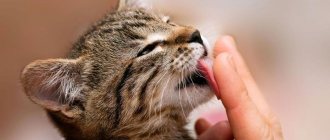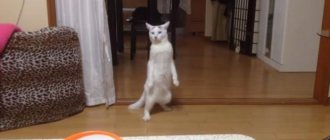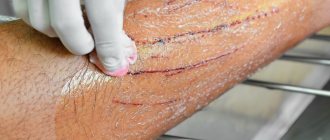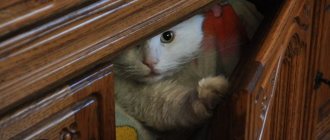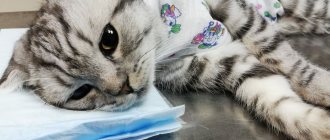10156Pavel
If your kitten is lethargic and sleeps constantly, there is no need to panic. A healthy pet sleeps almost the whole day during the first month of life, waking up to eat and play a little. Adult cats are already awake 7-9 hours a day. They spend time playing, hunting and communicating with their owners.
A cat may sleep constantly not only because of pain or loss of strength. Factors that influence sleep duration :
- heat, low atmospheric pressure;
- home comfort and calm atmosphere;
- high activity while awake;
- dense feeding of the pet;
- Age: Old cats and young kittens can sleep up to 20 hours a day.
© shutterstock
If the kitten is active and eats well when it wakes up, there is no need to worry. Prolonged sleep is physiologically normal, since protein nutrition of animals requires long-term digestion.
Natural Causes of Lethargy
The reasons for a lethargic, apathetic state can be simple and banal. For example, a similar reaction is possible to a change in weather. Most cats are more sensitive to changes in atmospheric pressure and the change from warm to rainy weather with gusts of wind compared to weather-sensitive people. But unlike people, a cat cannot say that it doesn’t feel well or take a pill to normalize its blood pressure. That is why she becomes lethargic, sad and phlegmatic, tries to sleep more and eat less, which is why she seems tired to her owner.
Lethargy in a cat can indicate many reasons for this condition.
You should not force a cat to play or eat; such behavior on the part of the owner can provoke aggression and resentment in the cat. As soon as the clouds clear and the bright sun appears, the pet’s mood will normalize, and she will again become playful and active.
Note! Cats also become drowsy and lethargic during extreme heat; this is how pets save themselves from overheating and dehydration. In hot weather, cats want to drink a lot and exercise little.
Lethargy and drowsiness in a kitten can be a result of boredom. A person has dozens of ways to overcome boredom, but a cat closed within four walls cannot boast of such a variety. For example, if your pet sleeps all day, you need to unobtrusively involve him in playing with one of his favorite toys. If the kitten immediately jumped up and began to play, it becomes clear that he was sleeping, because he had nothing to do. If the kitten lies lethargic and does not respond to play or favorite treats, despite a sunny, fine day outside, it is better to consult a specialist.
Lethargy and drowsiness overcome many cats 3-4 days after sterilization, the first weeks of pregnancy, during which they refuse to eat due to toxicosis. A similar reaction of the body may occur to vaccinations, medications, or anesthesia after surgery. It is worth considering the age of the pet. Weakness in an older cat is normal, because older cats are less active and mobile than younger cats.
The kitten is sleeping because he is bored
the kitten is breathing heavily with its stomach
Two days have passed, and the memories are already starting to get confused and erased. I’ll write everything down now, in fact, so that if I ever feel the urge to have a child again in my life, I’ll read all of this, remember and change my mind... Although my birth was not only easy, one could say it wasn’t there at all!! Well, let's start from the very beginning, a detailed description with all the accompanying emotions. So at about 10 pm my sweetheart and I went to bed to watch a movie about aliens, the eldest son at the computer so as not to see enough nasty things. They lay down, the baby started to get rowdy, plus training sessions again. Hell of a mixture. In the morning I had to surrender to the maternity hospital, due date 41.1. My husband delicately moved away from me, saying that he was scared, my stomach was shaking! I was even a little scared, is this happening to the baby??? we finished watching the movie, went to bed, I couldn’t sleep, the baby was still rowdy, I wanted to eat, I went to the kitchen and ate cookies with milk. She went and lay down again. I climbed onto BB to read stories, and then, at 2.20 am, on the 21st, the first contraction hit me. Covered it so much that my heels and palms were sweating!! After 8 minutes the second one. I still didn’t fully believe that this was IT. Third. Then I realized what had begun. I got up, I got jitters, I took a shower, and the shower felt good!! The contractions became less painful, I poured almost boiling water on my stomach, and was shaking with excitement. I didn’t wash for long, I got out and had another contraction. I can actually count them all, which ones they were and where they were. So far I remember almost every one!! Anyway, I got out of the bath, sat down next to my husband, woke him up, said, let’s go. Naturally, he didn’t understand, he thought that it was already morning, I should be taken to the district. What time is it? I tell him, three o'clock. It has begun, I say. He told me - are you sure? I’m not a gynecologist, I don’t know, but it hurts me!! And the adrenaline is off the charts! I went to wash myself. I'm getting ready. While I was getting dressed, a couple more contractions passed. Hurt. My husband went to warm up the car, come out in five minutes, he said. I got dressed, put on my shoes, contraction again, it hurts, it hurts, I pray, I’m all bent over. She came out, sat down, and put a diaper under her bottom. Go. There is a fight at the entrance to the road. Please don't shake me!!! Hurt! We arrived at the wrong entrance, I got out of the car, my husband called an ambulance and asked where the entrance was. We sit back down, there’s a contraction, I’m New, my husband says it hurts so much? I told him, imagine that they are trying to tear your balls off, like this. We arrived on the other side, while we were sorting out the packages, we approached the door, my husband opened it, there was a contraction, I couldn’t go in!! Wait, I say. The nurse comes out and opens the second door. I went in, took off my outerwear, shoes, put on slippers, and went to register. My husband is waiting. In general, while the contractions were taking shape again, I rubbed my lower back, breathed, and it helped a little. They formalized it, called you in to look, the 3rd finger is dilated, you are at the very beginning of labor. Oops! At the beginning??!! To her birthplace. They gave me a nightdress and I went to give my husband some clothes. I couldn’t restrain myself, I started bawling, he hugged me and said something, I told him, just go, go. I felt so bad and sad!! He left... I’m writing, and even now tears are welling up. I was left alone, among people strangers to me. Night. I feel hurt and wildly sad. I laid down for the enema, contraction, let me infuse it, it won’t hurt, it won’t be unpleasant, I don’t care. She filled me to the brim, there was a toilet right there. Sat down, uhhh!!! Here we go. Contraction, I'm pinching and scratching my legs, pray it hurts!! Then another one. I went to the shower, a woman came in who was giving an enema, it’s early, she said, go sit a little longer, I hear sympathy in her voice... I sat down, and in truth there was still a lot there))) but in my heart by the way it was easier, I thought in the maternity hospital I should ask about the shower. Ahah-) I threw up during the next contraction. In general, I did everything, went to the elevator, I was shaking. We got up on a chair, opened the bladder, there was no water. I went out into the corridor, there was a contraction, there was water... I vomited again. Downstairs I asked about anesthesia, they told me yes, they do, it was like a salvation!! Upstairs she started asking about anesthesia, the obstetrician laughed. It all just started for you, and you’re already asking for pain relief. The contraction that hit me after the puncture was many times stronger, I screamed, wow!! I was desperate!!! Now there is a new contraction, where is the anesthesiologist, let me run after him!! was talking some nonsense. Me into the ward, on the bed, on the belly of the CTG... Something out of the corner of my ear I heard that they would numb me, like promedol, I knew that this was complete crap. And so, as it was, I was in complete despair. it can't be put into words. You are lying down, there are strangers around you, they basically don’t care about your pain and torment, you can’t get up, and the worst and saddest thing is that now it will pass, the CONTRACT! And you can't escape it. She will definitely be there. It will hurt, but nothing can be done! This is scary. What do these contractions on the bed have to do with, they were nothing to say the least, I breathed them out, the most painful contractions that brought real fear to me were only a couple of them and at the end. But the funny thing is that each contraction is more painful than the previous one, psychologically more painful. Because that one has already passed, has been forgotten, it doesn’t exist, but this one is new, it will still be there, fresh. They came to see me, opening 6-7, yahoo!! I think for another couple of hours, this thought both warmed and frightened me. It was very painful. I was breathing like a locomotive, clutching the sheet, moaning, they didn’t allow me, they say I’m not the only one giving birth here, I kicked my legs, pulled myself up holding the bed rails. I was forbidden to do all this, but I did it, I don’t care. Then I tried to push up, oh, it was much easier for me to endure the contraction this way!! They yelled at me that you would break, but I didn’t give a damn. Then I just breathed them out again, it seemed impossible, I’m going to die, help me, God save me, for what!!! The pain goes away! Out! Mother! It's no use... The pain just came and did its job. You can’t hide anywhere, you can’t move it away, you can’t make it smaller, you can’t DO ANYTHING! I was given a sedative like a shot to an elephant. I was all wet, water was leaking out, I touched THERE, it was slimy. I constantly touched there in the hope of feeling the head))) and understanding that it was all over. They looked at me, complete! Then the doctor looked, not complete, 7-8. Not bad anyway, probably in 15-20 minutes. I clearly remember several of the most painful contractions, two of them I breathed out, one I squirmed and moaned. The rest were more or less tolerable. If such a word can be applied to contractions at all... I started to strain, the midwife looked, it was complete!!! I myself realized that it was complete, the child was climbing, she called the doctor, but there was no doctor. She's about to give birth!!! Oh God, I'm giving birth, now it's all over! The doctor came running, put me in a chair between contractions, put my arms and legs where they needed to be, didn’t put anything on me, and off I went! Three times per fight. It turned out clumsily but productively, I felt. It didn’t hurt, on the contrary, I really wanted to push, that when they passed, I wanted to push without her) we’re waiting for the next contraction, let’s go! How I tried, with all my might, growled, pressed, the head came out, more pushing, shoulders, everything. Didn't breathe. My first words, “My kitten is born!” . Then “breathe, breathe.” Then it hit me, I was babbling everything, kitten, bunny, my little one, I was in complete euphoria! Then they put him on top of me, then they took him away. 3940. I found out this only later, they didn’t tell me that 55 cm was even later. No breaks, 1 crack. Covered with iodine. Details. So as not to forget in general. They didn’t give me a diaper after the puncture, it was good to have my own, but still water flowed onto the floor... The attitude was rude. At the obstetrician's office. The doctor held back. I took a CTG and felt sick because they yelled at me. I apologized all the way... The enema did not come out completely, it came out on the bed. A little. I didn't give a damn. They looked painful. Blood and catheter don't hurt. The child was not squeezed out. She asked me not to cut me. There. They put a catheter in, it was unpleasant ((they pressed on my stomach - unpleasant. They showed the placenta, cool)) then everything was like everyone else... Two days passed, I felt very bad emotionally. I want to go home. I cried. It’s hard on my soul, it’s probably PRD. I feel bad. I gave birth very easily, three hours after the bladder was punctured, about an hour before giving birth. It's very fast. The contractions are painful only the last couple of times, and despite all this I don’t want to give birth anymore! I'm scared of these memories! And it’s mentally difficult. Maybe it will pass. My kitten is the sweetest, but)) something like this... Thank God that He heard my prayers, and my birth was so easy... Otherwise, I don’t know... I only hoped for Him, He helped. But it still turns me inside out. I want to go home and cry. And it’s not too soon to go home...
Serious reasons why a cat eats poorly and sleeps a lot and is lethargic
The dog is lethargic, refuses to eat and lies all the time
However, such a condition may also indicate a serious illness.
Worms
Associated symptoms:
- depressed state for several days;
- a sharp decrease in appetite or its complete absence;
- weight loss;
- disturbances in the functioning of the gastrointestinal tract (constipation, diarrhea, vomiting, flatulence, rumbling);
A swollen belly in kittens may be due to worms
- the coat is dull and crawling;
- swollen, barrel-shaped belly;
- dry crusts in the corners of the eyes without signs of inflammation;
- detection of traces of blood, fragments or whole worms in feces.
Important! If this disease is detected, your pet should be given an anthelmintic drug, the dosage of which is calculated according to the instructions.
Ticks
The bite of this external parasite can provoke piroplasmosis, the causative agent of which, entering the blood along with the saliva of the tick, spreads through the circulatory system in a matter of days and colonizes red blood cells. Its main goal is to weaken the immune system and disrupt the functioning of internal organs. If left untreated, such a bite can be fatal for the cat.
A burrowing tick can spread infection
If the cat is lethargic, sleeps all the time and eats little, has loose stools, vomiting, red urine and fever, you need to urgently examine it for a tick. The detected parasite must be removed, it is better if this is done by a doctor, because along with the tick’s saliva, the poisons and infection contained in it enter the cat’s body. But it is not always possible to quickly go to the clinic. In this case, you will have to remove the tick yourself using tweezers, a thin strong thread or another tool that can tightly grasp the body of the parasite. It is important to grab the bloodsucker as close to the cat's skin as possible and then carefully twist it clockwise.
For your information! A sharp jerk can tear off the body of the tick, and the head, remaining under the skin, will continue to spread the infection. Sometimes, when extracted, small head parts of the parasite remain under the skin, this is not scary, the cat’s immune system can handle it.
After removal, it is recommended to place the tick in a glass jar with alcohol or vodka; in such an environment, the tenacious parasite will die. And if you suspect infection with encephalitis or Lyme, you must deliver the parasite preserved in alcohol to the clinic for examination.
Poisoning
The cat does not eat well and sleeps constantly in case of poisoning, the causes of which may be stale food, household chemicals, medications, rodent poisons or secreted by house plants, etc. Frequent companions are severe chills, difficulty noisy breathing, lack of appetite, digestive tract upset (diarrhea, vomiting), increased salivation. In addition, there is a change in the color of the mucous membranes (reddened, blue or pale) and an increase/decrease in body temperature.
After poisoning, a cat lies a lot and moves little
Intestinal obstruction
This occurs due to the ingestion of small objects, the inability to regurgitate a large hairball, helminthic infestations, volvulus, or the consequences of gastrointestinal diseases.
Note! Owners often confuse obstruction with constipation, trying to eliminate the problem with a laxative, which causes greater damage to the pet’s health.
Pronounced symptoms of obstruction:
- a lethargic and apathetic state, a desire to hide from people and animals, in some cases loud meowing, obsessive following of the owner and attempts to pay attention to the stomach;
- a gradual decrease in appetite until a complete refusal to eat, food intake is accompanied by subsequent vomiting;
- prolonged absence of feces in the tray;
- aggression when trying to touch a swollen abdomen;
- Trying to get rid of gas, the cat rolls on the floor and carefully licks its stomach.
The cat is rolling on the floor due to intestinal obstruction
Asthma
With such a disease, the cat quickly gets tired and does not have the strength to play its usual games. She breathes with difficulty, often and shallowly, whistling sounds emerge in her breathing. The usual posture for an asthmatic is a hunched back, with the neck very elongated in a sitting position. As the disease progresses, apathy and drowsiness increase. If you notice the first signs, you should urgently visit a veterinarian.
You can't help but notice your cat's asthma by its noisy breathing.
Urolithiasis
The first symptom of such a disease is frequent, prolonged and painful urination in the wrong place, which at first the owner may mistake for the pet’s misconduct. The painfulness of the process and resentment for undeserved punishment provoke a change in behavior - the cat becomes sad, phlegmatic and drooping.
As the disease progresses, the pet runs to the toilet more and more often, in most cases not reaching the litter tray, since it can no longer restrain the urge, rapidly loses weight, and more and more blood enters the urine. If you notice an increase in urination and traces of blood in the urine, you should urgently seek help from a veterinarian to prevent the development of an advanced form of the disease and the manifestation of severe symptoms.
Urination posture for urolithiasis
Causes of pathological changes in breathing rate
If the kitten is breathing rapidly with its mouth open, this may indicate that the animal has some kind of health problem. For this reason, it is extremely important to closely monitor your pet's behavior and any changes in its breathing. This is especially important if the rapid, open-mouth breathing is accompanied by any additional symptoms that may indicate that the kitten is suffering from a medical condition. This may be a change in the color of the mucous membranes, all kinds of noises and wheezing during breathing, discharge from the mouth or nose, changes in pulse rate, and so on. And if the owner of a kitten discovers alarming symptoms, he should first of all, of course, contact a veterinarian without trying to cure the pet on his own or, which is no better, simply “wait it out” until the disease goes away on its own.
What determines the breathing rate of a kitten?
It must be said that the respiratory rate can change in one direction or another at elevated temperatures, overheating of the body (in this case it becomes more frequent), during hypothermia (in this case the respiratory rate becomes less frequent), as well as during dehydration or when the kitten hurt.
A sign of the presence of damage to the spine, lungs, ribs, pectoral muscles and chronic pathologies of internal organs may be abdominal breathing.
If the animal's breathing is very noisy and is accompanied by fever and a dry cough, then this is a sign that the cat has developed bronchitis. A sign of inflammation of the nasopharynx is sniffling and wheezing during nasal breathing.
Be sure to examine your kitten; perhaps breathing problems indicate the presence of a disease in the body.
It is extremely important to note that noisy breathing is a reason to immediately contact a veterinarian. This is due to the fact that it may indicate some pathologies of the cardiovascular system, pneumonia, and be a symptom of pulmonary edema.
If the kitten, despite difficulty breathing, does not exhibit any other symptoms that could alert the owner and suspect any disease, then it is likely that it was caused by some foreign object stuck in the mouth or throat. In view of this, neither kittens nor adult cats should under any circumstances be given poultry bones (especially tubular bones) or fish, since they are the ones that most often get stuck in cats’ throats, and sometimes even lead to the death of the animal by piercing internal organs.
Main symptoms of hind leg failure
Unlike hidden diseases that do not have pronounced signs, pathologies of the extremities are not difficult to determine. Pet owners note the following signs:
- the animal's gait changes, the rear part of the body becomes unsteady;
- inhibited movements, the pet loses coordination;
- weakness of the hind legs (limbs move apart, after a few days they fail);
- general mobility decreases;
- the cat does not stand on its hind legs, begins to drag them, practically without lifting them from the floor;
- the animal periodically squats.
Delay and self-medication only worsen the pet’s condition. The discomfort increases, the cat suffers from severe pain, and paralysis spreads to the entire body.
Causes
Dysfunctions leading to failure of the hind legs can be of different origins: viral, post-traumatic, orthopedic, associated with metabolic disorders in the body, etc.
Thromboembolism
A dangerous disease in which a blood clot formed in the circulatory system gets stuck in the femoral arteries. Since no blood flows to the legs, the deterioration occurs quickly, starting with a refusal of motor activity in the hind limbs and ending with death three to four days after the onset.
The onset of thromboembolism is accompanied by periodic shaking of the paws; the cat behaves restlessly, meows pitifully, and may bite or scratch when trying to touch the painful area. Paralysis develops quickly, the paws become cold, the animal refuses food and water. The chance of cure for thromboembolism is small, so it is important to seek help in the first hours after detecting paw failure.
Progressive vitamin deficiency
This phenomenon is most often observed in kittens in the active growth stage and in lactating cats. The causes of vitamin deficiency include the presence of parasites in the body, lack of sunlight, treatment with strong antibiotics or poor nutrition. In addition to paralysis of the legs, severe lethargy, weight loss, and anemia occur.
Kidney failure
This disease leads to failure of the entire genitourinary system, in which paralysis of the hind legs, decreased urine volume, lethargy, diarrhea and vomiting, and increased body temperature are observed.
Dysplasia
Dysplasia develops against the background of congenital abnormalities of the hip joint, increasing the likelihood of a fracture or dislocation. The picture is aggravated by the cat’s low physical activity, poor nutrition with a lot of protein and excess weight. After limb failure, the animal may move little around the home, sometimes missing the tray.
Cardiomyopathy
It occurs due to thickening of the walls of the heart and an increase in its volume. With cardiomyopathy, leg paralysis in cats is a fairly rare complication, but it should not be completely forgotten.
Paralysis of the limbs occurs because the heart is unable to supply them with the required amount of oxygen, and the muscles begin to atrophy. At the same time, shortness of breath, lethargy, and dry cough develop, and the animal sleeps more than expected.
Stroke
Failure to move a cat's limbs can cause a stroke. Impaired vascular patency is observed not only in old animals, but also with exhaustion or low mobility in young animals. During a stroke, the swallowing reflex is disrupted and the activity of the salivary glands increases. The owner rarely notices the attack itself, but its consequences - paralysis of the paws and other parts of the body - are easily detected. In this case, as in humans, the success of rehabilitation is directly related to how early it is started.
Spinal injury
This condition occurs after a cat falls from a certain height. In this case, it does not necessarily land on its back; it can even fall on its paws, but with a sharp landing it can damage the posterior part of the spinal cord.
After this, failure of the hind legs and tail occurs, and possibly a disruption of the innervation of individual internal organs.
Intervertebral hernia
An experienced veterinarian may be able to feel the disc bulging above the rest of the vertebrae, but those without experience are unlikely to be able to identify the affected area. A hernia leads to the fact that blood vessels and nerves are pinched, impulses stop flowing to the hind legs, and this provokes their failure. For normal paw activity, the cat's impulse patency must be restored.
Tick paralysis
This disease develops after an animal is bitten by an ixodid tick, so caring owners usually direct their attention to prevention: they treat the cat’s fur with special preparations before walking outside. Tick paralysis leads to damage to the nervous system, which manifests itself in the form of alternating periods of excitement and apathy. In this case, at the stage of leg failure, treatment is no longer effective, so help should be provided in the early stages.
Brain inflammation
This dangerous pathology is caused by infections of the nervous tissue, worms, the entry of toxins into the body, activation of autoimmune diseases, etc. In addition to failure of the hind legs, a number of symptoms appear: vomiting, diarrhea, fever, enuresis, dehydration.
With timely treatment, motor activity of the limbs is restored completely or partially.
Hyperparathyroidism
A special condition that occurs against the background of a deficiency of vitamin D and calcium and excess phosphorus, which negatively affects the thyroid gland. Due to the fact that a large amount of parathyroid hormone is produced, bone tissue deformation, convulsive syndrome, and paws begin to fail. The treatment takes a certain time, the hormonal levels are restored, which returns the cat freedom of movement.
Fracture or dislocation of the hind limbs
This can happen as a result of a fight, beating, blow, or unsuccessful jump. Sometimes cats get stuck in plastic windows and, trying to get out of the trap, cause additional damage to themselves.
At the same time, the animal may be hostile to attempts to probe the site of injury, and sometimes purrs loudly and lies next to its owners all the time. After a few days, the cat is usually able to stand on its feet, but the fracture is likely to heal incorrectly.
